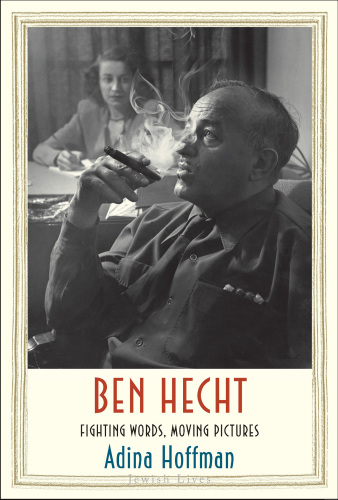
Ben Hecht
Fighting Words, Moving Pictures
کتاب های مرتبط
- اطلاعات
- نقد و بررسی
- دیدگاه کاربران
نقد و بررسی

November 15, 2018
Concise biography of a prominent Hollywood writer who became an outspoken advocate for Jewish causes.In the Depression era, Ben Hecht (1893-1964) was one of the most famous--and highly paid--Hollywood screenwriters, whose prodigious movie credits include Scarface, Twentieth Century, Spellbound, and Notorious. Essayist and biographer Hoffman (Till We Have Built Jerusalem: Architects of a New City, 2016, etc.) rescues him from historical obscurity in a lively, well-researched addition to the Yale Jewish Lives series. Hecht was the son of Russian immigrants who moved during his childhood from the tenements of New York to Racine, Wisconsin. At 17, he dropped out of the University of Wisconsin and fled to Chicago with no plans except to escape. An uncle finagled a job for him at the Chicago Daily Journal, beginning his career as a reporter that honed his writing skills and inspired his acclaimed 1928 play, The Front Page, co-written with Charles MacArthur. Hecht was a colorful figure in Chicago, consorting with artists and writers who fomented the city's cultural renaissance and getting his work published in Margaret Anderson's groundbreaking literary journal, The Little Review. Chicago in the 1920s, one historian remarked, "was the Age of Hecht." By 1924, he had married, become a father, and left his wife to move, with his lover, to Manhattan, where he dove enthusiastically into the "weeklong benders, wild parties, frantic extramarital coupling," and heady creativity of Jazz Age America. Hollywood soon beckoned, and Hecht's "glib wit and knowing insouciance" kept him in demand as a writer and script doctor. Not until 1939, when European anti-Semitism gained international attention, did Hecht embrace his Jewish identity. Although he insisted that "he wasn't a man of causes," he made a fervent, vociferous commitment "to the besieged Jews of Europe, to Palestine, and eventually to the state of Israel." On March 9, 1943, 40,000 people gathered in Madison Square Garden to witness We Will Never Die, a star-studded production--Hecht's "Jewish passion play"--publicizing the plight of European Jewry.A cleareyed portrait of an impetuous and multitalented man.
COPYRIGHT(2018) Kirkus Reviews, ALL RIGHTS RESERVED.

Starred review from February 1, 2019
The Front Page is Ben Hecht's most readily cited claim to fame, yet it is only one of many resounding successes in a rollicking life bursting with creativity, conviction, and controversy. Hoffman (Till We Have Built Jerusalem, 2016), a former film critic and superb essayist and biographer, illuminates, in this precise and lively portrait, every contradictory element of Hecht's rogue personality, protean artistry, and impact as a whirlwind activist calling for support of Nazi-besieged European Jews and the establishment of Israel. Each phase in Hecht's adventures is electrifying, beginning with his Chicago reporter years when he hung out with Carl Sandburg, Sherwood Anderson, and other radical literati, to his storming of Broadway and prompt summons to Hollywood. There Hecht, a brassy tough-talker, won the first Academy Award for an original story for the gangster film Underworld (1927), and went on to work as screenwriter (credited and uncredited) for a long list of now-classic movies, including Scarface (1932), ?His Girl Friday (1940), Notorious (1946), and Strangers on a Train (1951). Hoffman describes Hecht as vociferous, downright hellacious, a firebrand, and a master juggler, as she chronicles and analyzes his hectic productivity and evolving thinking on the front lines of major artistic leaps and historical crises. Hoffman's concentrated biography is smartly entertaining and revelatory.(Reprinted with permission of Booklist, copyright 2019, American Library Association.)

























دیدگاه کاربران